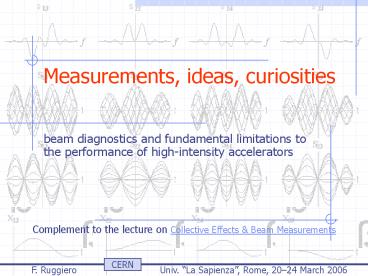Measurements, ideas, curiosities - PowerPoint PPT Presentation
Title:
Measurements, ideas, curiosities
Description:
Complement to the lecture on Collective Effects & Beam ... Longitudinal Schottky scan spectrogram during debunching. Low-intensity beam. High-intensity beam ... – PowerPoint PPT presentation
Number of Views:30
Avg rating:3.0/5.0
Title: Measurements, ideas, curiosities
1
Measurements, ideas, curiosities
- beam diagnostics and fundamental limitations to
the performance of high-intensity accelerators
Complement to the lecture on Collective Effects
Beam Measurements
2
Transverse head-tail modes at the CERN PS (E.
Metral, 1999, 20 revolutions superimposed)
Time (20 ns/div)
3
Fast vertical single-bunch instability with
protons at the PS near transition in 2000
(Courtesy E. Metral)
?, ?R, ?V signals
Tail unstable
Head stable
700 MHz
Time (10 ns/div)
? Instability suppressed by increasing the
longitudinal emittance
4
Fast vertical single-bunch instability with
protons at injection in the CERN SPS (E. Metral,
2003)
- Instability suppressed by increasing the
chromaticity
5
LONGITUDINAL HIGH INTENSITY EFFECTSExperiment
with a CERN PS proton beam in 1999
? Longitudinal Schottky scan spectrogram during
debunching
200 ms
Low-intensity beam
High-intensity beam
Courtesy R. Garoby
6
Longitudinal Solitons in RHIC
- Wall Current Monitor data for a proton bunch
freshly injected into RHIC (left) and for the
same bunch after 17 minutes (right) - Injection is at g 25.9, i.e. above transition
gt 23.8 - These oscillations should be Landau damped
- When nonlinear effects are included, long lived,
stable coherent oscillations become possible for
low-intensity beams - Long-lived beam holes have been observed below
transition in the CERN PS Booster
Longitudinal phase space distribution obtained by
a self-consistent solution of the Vlasov equation
Longitudinal Solitons in RHIC, M. Blaskiewicz,
J.M. Brennan, P. Cameron, W. Fischer, J. Wei, A.
Luque, H. Schamel, PAC03
7
- Vertical growth rate of head-tail modes in the
LHC as a function of chromaticity at injection
energy, for 3000 bunches of nominal intensity
At injection head-tail modes with growth rates up
to about 4 sec-1 are stabilized by lattice
nonlinearities (assuming an amplitude detuning of
0.002 at 6 sigma). The rigid mode m0 has to be
stabilized by the transverse feedback.
8
Beam Echo Measurements at CERN
- An echo is formed by the interference of two
consecutive RF pulses with slightly different
frequencies. Each RF excitation induces a well
defined pattern of particle energy along the
machine circumference, rapidly destroyed by the
revolution frequency spread. However, the long
lasting memory of the proton beam allows the
re-appearance of an ordered structure long after
the initial excitations. - The timing of the echo response depends on the
frequency of the kicks and their separation the
longer the separation, the later the echo in the
SPS we have observed echo delays up to two
minutes (i.e., more than 5 millions turns). - The picture shows the superposition of 22 echo
measurements with different time separations
between the two RF-kicks, ranging from 5 to 220
ms. The vertical axis shows the absolute value of
the echo amplitude on a linear scale and the
horizontal axis shows the time measured from the
first RF-kick. The horizontal scale is 50 s. The
solid line shows the analytical estimate for the
echo envelope assuming a diffusion coefficient of
10-13 s-1 in order to observe such a small
diffusion with the Schottky signal, one would
have to wait more than one day.
9
Collective Effects web links references
http//ab-abp-rlc.web.cern.ch/ab-abp-rlc/ (web
site of the RD and LHC Collective Effects team
at CERN) Physics of Collective Beam
Instabilities in High Energy Accelerators,
A. Chao, (Wiley, 1993) Impedances and Wakes in
High-Energy Particle Accelerators, B.W. Zotter
and S. Kheifets, (World Scientific,
1998) Longitudinal holes in debunched particle
beams in storage rings, perpetuated by
space-charge forces, S. Koscielniak, S. Hancock,
and M. Lindroos, Phys. Rev. ST Accel. Beams 4,
044201 (2001) Beam dynamics studies for uniform
(hollow) bunches or super-bunches in the LHC
beambeam effects, electron cloud, longitudinal
dynamics, and intra-beam scattering, F.
Ruggiero, G. Rumolo, F. Zimmermann, Y.
Papaphilippou, CERN LHC Project Report 627
(2002) Intrabeam Scattering with
Non-Ultrarelativistic Corrections and Vertical
Dispersion for MAD-X, F. Zimmermann,
CERN-AB-2006-002 (2006)































